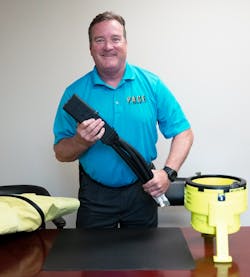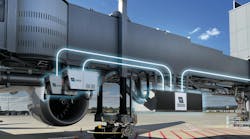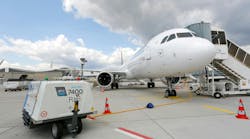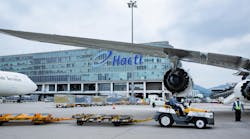Name: John Moore
Job Title: Chief Executive Officer
Company: PAGE GSE
Location: Fountain Inn, S.C.
Years of experience in ground support industry: 37 years
Years with current company: 2.5
Previous employers in the industry: Air-A-Plane Corporation; Trilectron Industries/ITW GSE; Oxford Airport Technical Services/Worldwide Flight Services (WFS); Harlan Global Manufacturing; Tronair; PAGE GSE.
Industry committees, associations and working groups served on:
SAE AGE 3 Aircraft Ground Equipment voting member 1986-present
IATA GSEE committee member 2010-2016
Founding member IAEMA
Ground Support Worldwide: What attracted you to a career in the ground support industry?
John Moore: Global travel, different cultures and evolving technologies. I didn’t know about the technology getting in it. So, it was the travel initially.
I was in the music business, and I was a production manager working my way through college. We had a concert hall that needed air conditioning. We looked up something and it said, “Emergency Air Conditioning Company” and it was a division of Air-A-Plane Corporation, which was the inventor of ground pre-conditioned air back in 1946. We pumped cold air into the concert hall with their equipment.
I had just got off the road with AC/DC. I told Norm Kosciusko, who was the sales director at Air-A-Plane, that I just graduated from Old Dominion with a degree in international marketing in business administration. He said, “If you can do this, you can do anything. Come work for me.” I said why not? That’s what got me started back in 1986.
GSW: What has kept you engaged in the industry?
JM: The people. I have friends around the world. It’s fast-paced, innovative and always growing. People need to fly. Airlines and the aircraft do the flying and GSE supports the planes on the ground.
Then there is the technology piece. You get to see the needs at the ground level. At Air-A-Plane Corporation, I was on the team that introduced the first direct expansion pre-conditioned air unit. At Trilectron Industries, my next stop, we developed several new products and many different model numbers within those products. Trilectron Industries was a $7 million business, and we grew it to a $100 million business. I was also part of the 180 kVA GPU for the 777. I wasn’t the engineer, but I was bringing the customer’s needs to the engineering team, and we all worked together – including the customer – in designing this equipment. At Worldwide Flight Services and Oxford, I sold maintenance contracts for ground support equipment. We opened like 50 GSE shops. With Jamie Kaplan and the Harlan team, I found customers to work through what would be the first all lithium-powered – not repowered, but new – bag tractor.
GSW: What’s the best advice you’ve been given while working in this field?
JM: When I first started in the industry, the founder of Air-A-Plane Corporation William L. Shepheard Sr. said, “Keep your eyes and ears open and your mouth shut.” Today that would translate to “Keep an open mind on how things get done in our industry.”
Coming out of college, I was 23. There were a lot of mechanics and engineers, who had been with the airlines from back in the day. I wasn’t about to tell them anything. I was a sponge, learning from these very talented individuals.
GSE cannot be a cookie cutter approach to equipment. Different parts of the world require specifics on the equipment not needed elsewhere.
GSW: How have you seen the ground support industry change the most during your career?
JM: Many GSE equipment manufactures evolved from mom-and-pop organizations, machine shops, mechanical contractors and unrelated industries using equipment to cross over to aviation applications. Today GSE is pretty much designed for aviation applications from the ground up.
Stewart and Stevenson started as a blacksmith. Air-A-Plane Corporation started as an HVAC mechanical contractor. Hobart Ground Power, I believe, came out of a welding shop. A lot of those companies were tweaking technologies. But today, you see a dedicated application, in most cases, it is tweaked to a location for a reason.
GSW: Has this change been to the benefit or detriment of the industry?
JM: Definitely a benefit. We do still benefit from technology derived from the automotive industry. But today’s GSE is more efficient and designed specifically for its purpose. It’s safer to operate and ruggedized for the rigors of the ramp.
GSW: What’s the next big thing coming to the ground support industry?
JM: Electrification, automation, alternative fuels/fuel cells, and telematics.
The SAE team is talking about standardization of charging systems. If you’ve got a charger, and you don’t have the right plug, you can’t charge it. We’re working through that. Automation is going to be huge in 10 years probably, and it’s already started. Telemetry is a big deal for efficiency, time and reporting.
GSW: What type of an impact will it make?
JM: More efficient, safer, environmentally friendly, value for the money, lower cost to operate adding to a better bottom line for the airlines. We’re building training and knowledge into the equipment to make it safe. Proximity and laser technology, lidar, safety switches – everything is being built in like automatic braking solutions, deadman switches. That wasn’t there back in the day. If you can design safety into equipment, it’s money well spent.
GSW: What would you say to encourage someone to join the ground support industry?
JM: It’s a close-knit, niche industry that involves cutting edge technology with a global reach for a common goal. Anybody who is in it for the long run has to be dedicated. We all try to work together to same end – safe, efficient operation on the ground with our equipment. It’s key that we all talk to each other and understand our needs from each other’s perspective.






